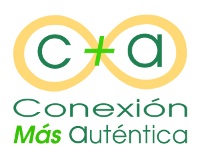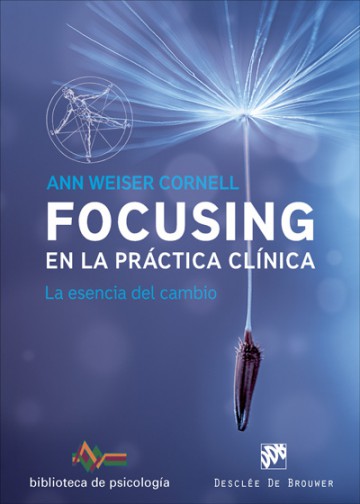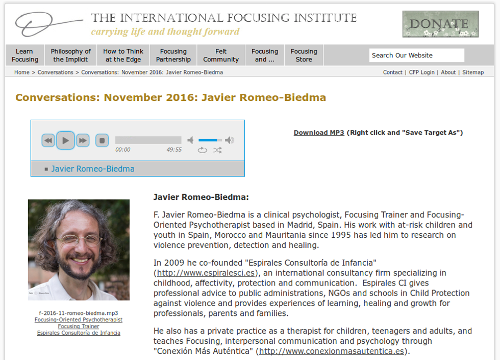Label: Focusing
Manual “Focusing in clinical practice” de Ann Weiser Cornell (translated by F. Javier Romeo)
29 November 2016.
Tags: Agenda actual, Focusing, Focusing in Spain, Focusing international, My Classifieds, Psychotherapy, Therapy, Textos Focusing
It is a pleasure for me to share publishing Focusing in clinical practice. The essence of change, the last book Ann Weiser Cornell in Spanish, in this case translated by me.
In a carefully edited within the Psychology Library of Editorial Desclée, This book appears thanks to the joint work of many people, I thank you from here.
First, Ann Weiser Cornell He has been willing to publish the book (which first it appeared in the prestigious American publishing mental health W. W. Norton), and it has been in the translation every nuance, answering various questions and looking me the words tighter each of its concepts and expressions. He has contributed a warm prologue to the Spanish edition (which can be read in the promotional booklet), in which he says:
In this book I have tried to explain the Focusing simply but without losing the complexity that makes it so special. I tried to make this book very practical, so that the clinician can use immediately. (P. 18)
On the other hand, the urge Isabel Gascón, National Coordinator and my mentor Focusing Focusing, you have set the book, from coordinating with the publisher until complete review of the drafts and a presentation to the Spanish edition which it highlights the interest of this book in the Spanish-speaking world (also available in promotional booklet).
By last, It is appreciated the concern and care of the editorial team Desclée, who has worked for a clear and elegant book, in one of the most prestigious collections of psychology in Spain.
In future posts I will comment more aspects that I find this book useful. By the time I leave you with the index (which is extended here), I will comment on the various chapters in other blog entries:
- Introduction. A door opens.
- 1. The essence of change.
- 2. Prepare for the meeting: Entering Focusing sessions with clients.
- 3. Recognize and cultivate heartfelt feelings.
- 4. Help customers who felt sensations arise.
- 5. Cultivate the Self-en-customer presence: The essential environment for heartfelt feelings.
- 6. deepening: How to facilitate change sense.
- 7. When it costs us more to work with some difficulty customers.
- 8. Focusing en trauma, addictions and depression.
- 9. Focusing on integrating different therapeutic modalities.
- 10. Focusing therapist.
- Appendix.
For me it is a celebration that we can have this book so practical and yet profound, and I hope you enjoy reading it as much as I have enjoyed translating.
Note:
If you want to try Focusing session, or start therapy, I have my psychology consultation in Madrid, where I accompany children, adolescents and adults and will be happy to welcome you.
Focusing tutored in Madrid in November 2016
25 November 2016.
Tags: Agenda filed, Focusing, Focusing en Madrid, Training, Psychotherapy, Therapy
As everything in life, Focusing is learned by practicing.
Focusing practices are a fundamental space in the learning of Focusing. With a structure in three roles that rotate (who focuses, who accompanies and who observes), you learn from each of them, with a part of focusing and another part of shared comment, from a welcoming and curious environment (essential in Focusing), and under my supervision as a trainer. From the comments we all learn (I also), and we can take ideas for our own Focusing practice, when accompanying and focusing.
Dates: viernes, 25 November 2016, of 16:00 a 20:00. (There is the possibility of doing only two hours, if there is enough group).
Place: Psychology Consultation
C / Ferraz, 43, 1Exterior º Left
28008 Madrid
Metro: Argüelles (lines 3, 4 and 6) a five minute walk.
bus: 21 and 74 two minutes walk. 1, 44, 133 and C2 a five minute walk.
Price:
- 2 hours, 35 euros.
- 4 hours, 70 euros.
Minimum three participants, maximum six, to ensure the quality of training.
More information and registration by contacting me at the phone (+34) 657 680 165 or email.
[Original entry 18 November 2016, actualizada a 25 November 2016, date of the tutored practices].
Level II Focusing on Madrid “Practice the six steps” the 19 and 20 November 2016
20 November 2016.
Tags: Agenda filed, Focusing, Focusing en Madrid, Training, Psychotherapy, Therapy
To consolidate a minimum base in Focusing, This entry offers Level II of Focusing “Practice the six steps” linked to Level I of Focusing that can be taken 1 and 2 October 2016, the 15 and 16 October 2016 or the 29 and 30 October 2016.
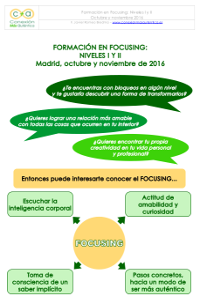 Level II provides the basic tools to begin accompany Focusing processes. We will practice how to accompany our own inner processes through autofocusing, especially on written focusing. And we will also experiment in pairs how to accompany another person, following both the steps of the methodology and the basic attitudes of listening and presence.
Level II provides the basic tools to begin accompany Focusing processes. We will practice how to accompany our own inner processes through autofocusing, especially on written focusing. And we will also experiment in pairs how to accompany another person, following both the steps of the methodology and the basic attitudes of listening and presence.
valid course for obtaining the Diploma of Focusing, recognized by the Focusing Spanish Institute as 12 hours Level II.
Date: sábado 19 November 2016, of 10:00 a 14:00 and of 16:00 a 20:00 and Sunday 20 November 2016 of 10:00 a 14:00.
Place: Psychology Consultation
C / Ferraz, 43, 1Exterior º Left
28008 Madrid
Metro: Argüelles (lines 3, 4 and 6) a five minute walk.
bus: 21 and 74 two minutes walk. 1, 44, 133 and C2 a five minute walk.
Price: 150 euros. It includes materials.
DISCOUNTS:
- discount 25% for people who can prove their status student, unemployment or retirement.
- discount 25% for people who have done the Level I with me in the 90 days prior to Level II (for example, the 1 and 2 October 2016, the 15 and 16 October 2016 or the 29 and 30 October 2016).
- discount 50% for people who have already completed Level II and want to repeat.
- These three discounts cannot be combined with each other.
More information and registration by contacting me at the phone (+34) 657 680 165 or email.
Download the document with all the information about Levels I and II Focusing in Madrid.
[Original entry 20 September 2016, actualizada a 20 November 2016, date formation].
My interview “Focusing and how to work experientially with issues of violence” International Focusing Institute
14 November 2016.
Tags: Agenda actual, CI Spirals, Focusing, Focusing international, In English, My Classifieds, Psychotherapy, Therapy, Textos Focusing, Experiences
A deep sense of honor and a clear feeling of humility and shyness arise in me as I share this interview. I can clearly feel the responsibility of talking about the work I do on “Focusing and how to work experientially with issues of violence” (“Focusing and how to work experientially with violence”), as the English title of the conversation says. It is an important topic for me (I work a lot on it through Spiral Consulting Children, the consultancy specialized in Child Protection of which I am a founding partner), and trying to convey all the nuances is always a challenge.
International Focusing Institute (The International Focusing Institute, the organization that coordinates at an international level the activities related to training and dissemination of Focusing) promotes “Conversations” (English) with Focusing professionals from around the world. Serge Prengel, a Focusing Trainer and Focusing-Oriented Psychotherapist whom I met at the International Focusing Conference 2016 Cambridge (United Kingdom), acts as host, and he does it in a very Focusing way - with an empathic reflex, with pauses, allowing new ideas to emerge and unfold at their own pace–.
In this “Conversation” you will find that we discuss topics such as the following:
- Violence as a stopped process (“Something would have to have happened to move the situation forward, but it didn't happen, so that the process is blocked”).
- Damage defines violence, and the damage is experienced from the body.
- Find a “handle” (“handle”) for violence (identify her) is the first step to get out of it: For this, it is necessary to become aware of the cultural patterns that make us normalize violence.
- The role of power in violence.
- Affection coupled with care as a way to avoid violence –and the bodily dimension that can be achieved through Focusing–.
- Detection and intervention in cases of violence in Child Protection.
- A message of hope regarding the possibilities of healing and transforming violence, and Focusing as a magnificent tool to do it.
And if you want to experience how to transform the experience of violence from the body through Focusing, I am available for specific sessions the for psychotherapy in Madrid.
I hope you can find some ideas that inspire your own experiential work on violence, and I would love to hear your reactions to it.
My interview about “Focusing and how to work experientially with violence” for The International Focusing Institute
14 November 2016.
Tags: Agenda actual, CI Spirals, Focusing, Focusing international, In English, My Classifieds, Psychotherapy, Therapy, Textos Focusing, Experiences
A deep sense of honour and a distinct feeling of humility and shyness come to me when I share this interview. I can feel clearly the responsibility of talking about the work I do about “Focusing and how to work experientially with violence”, as the title of the conversation says. It is an important subject for me (I work a lot about it through Spiral Consulting Children, the international consulting firm specializing in Child Protection I co-founded), and trying to convey all its nuances is always a challenge.
The International Focusing Institute (the organization that coordinates internationally Focusing activities related to training and diffusion) fosters bimonthly “Conversations” with Focusing professionals all over the world. Serge Prengel, a Focusing Trainer and Focusing-Oriented Psychotherapist that I met at the International Focusing Conference 2016 in Cambridge (UK), acts as the host, and he does so in a very Focusing way –reflecting, with pauses, letting new ideas appear and develop in their own time.
In this “Conversation” you will find discussed issues like the following ones:
- Violence as a stopped process (“Something should have happened to carry forward a situation, and it did not occur, so the process gets stuck”).
- Harm defines violence, and harm is lived from the body.
- Finding a handle for violence (identifying it) is the first step out of it: becoming aware of our cultural patterns that normalize violence.
- The role of power in violence.
- Affection linked to care as a way to avoid violence –and the bodily dimension that can be reached through Focusing.
- Violence detection and intervention in Child Protection.
- A message of hope about healing and transforming violence, and Focusing as a wonderful tool to do it.
I hope that you will find an idea or two that might inspire your own experiential work about violence, and I will love to hear from you about it.
Read this entry in Spanish (although the interview itself is in English).
brush strokes (2) International Conference Focusing: the interest group Community Wellness Focusing
7 November 2016.
Tags: Focusing community, Focusing, Focusing in Spain, Focusing international, Textos Focusing, Experiences
Picking up the thread entries with brushstrokes of the International Conference Focusing which it took place in Cambridge (United Kingdom) of 20 to the 24 July 2016, Interest Group Community Wellness Focusing (Focusing the Community Wellness) It was for me one of the points destados. It was an experience of creating a community of shared manner by listen out, the translation, our previous communities and the Focusing attitude.
It's been a few months, and I've been writing about my experiences (All entries appear in the final index this entry), and it arises me a warm and tender feeling when I remember to this Group. Each morning of the conference participants a whole we joined one of the fifteen Stakeholders. These were groups that wanted to be an open space to share personal and professional points of view on focusing in specific areas. To me they tempted me many titles (There was even a “No Specific Interest Group Interest”, although the joke sounds better in English). I am very satisfied with my choice, while I regret not being able to divide myself for being able to attend many others…
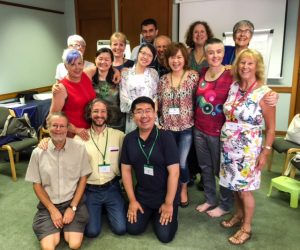
Interest Group Community Wellness Focusing on the International Conference Cambridge (RU), julio de 2016.
The Interest Group Community Wellness Focusing (Focusing the Community Wellness) It was coordinated by Nina Joy Lawrence, Pat Omidian and Heidrun Essler, who created the container space so that we could participate and, as they had already anticipated, for “introduce the skills and attitudes Focusing on our daily lives and community groups” even in our own group of interest-. Thank you!
The first element was the listen out. We were sixteen participants from six different countries (Afghanistan, Germany, China, Spain, United States and United Kingdom), and not everyone was fluent in English, so the first step in building our community was to ensure that everyone could express themselves and understand anything we said: That meant just using three different working languages (English, Chinese and Spanish). What it could have been a burden (translate, for example, what a Chinese participant said English, and then to Spanish, and then answer in English, and then translate the answer into Chinese and Spanish, etc) It became a precious gift: the ability to listen to each person from a profound attitude of Focusing, even before they had translated the words. So we cultivate a way of being in company with a leisurely pace, a space in which each person was listening to others who spoke foreign languages and, somehow, in the end, we begin to understand the experiences of those who spoke before translation.
The second experience, which it was especially poignant for me, was the translation In herself. I've been in different situations and translating between different languages more than two decades, and very often in professional environments (for example, forming translating foreign Focusing here in Spain). But for me translate a conversation Focusing always a special effort, to be aware of translating both the words and the implicit experience in these words chosen.
That led me to another level: the fact of being translated (between English and Spanish, in both ways) in a group I felt like a community reminded me of my translations of immigrant adolescents to build a partnership group that no longer exists. When I shared this double experience, on the one hand, satisfaction of being able to translate in a community setting and, for another, mourning the defunct association, other group members also shared on communities that had lost their part-and how our previous communities They were present and had a room in what we were creando-.
During those four sessions talk, We tried exercises, commented… As I shared in the final round closing, I had come to the group with the main objective to get ideas, techniques and exercises to create a community that uses the Focusing. However, I take a very different: a Focusing attitude which favors the presence, It is allowing the group and each of its members to pay attention to a quality other than be feeling, a connection that remains from the body.
Here are some lessons that will stay with me for a long time (in fact, I have already visited Focusing Initiatives International, the organization that helps spread the Community Wellness Focusing, and I've subscribed to Community Wellness Focusing Discussion List, mailing list that reports this current, English), like deep gratitude to our host and each member of the group. now it “carry forward” all these experiences by creating communities that have these attitudes Focusing.
I wish you read to me many profound experiences of community building like this.
Note: The image is published with the permission of the group members. No names are given out of respect for your privacy, except those of the host-moderator who publicly offered Interest Group.
The Community Wellness Focusing Interest Group at the Focusing Conference in Cambridge (UK) 2016
7 November 2016.
Tags: Focusing community, Focusing, Focusing in Spain, Focusing international, In English, Textos Focusing, Experiences
The Community Wellness Focusing Interest Group was for me one of the highlights of the International Focusing Conference in Cambridge (UK) July 20th-27th 2016. It was an experience of co-creating a community through listening, translation, our previous communities and Focusing attitude.
Some months have passed, and I have been writing about my experiences at the Conference (all posts indexed in this post in Spanish), and a warm and tender feeling comes to me when I remember this Group. Every morning during the Conference all participants joined one of the 15 Interest Groups. These were groups intended to be an open space to share personal and professional perspectives about Focusing in specific domains. I was tempted by many of the titles (there was even a “No-interest Interest Group”!) and I am very happy about my choice, while I regret not being able to split myself in order to attend to many others…

Community Wellness Focusing Interest Group at the International Focusing Conference, Cambridge (RU), July 2016.
The Community Wellness Focusing Group was hosted by Nina Joy Lawrence, Pat Omidian and Heidrun Essler, who created a holding space for all of us to participate and, as they advanced, “to bring Focusing skills and attitudes into our daily lives and into community groups” –including our own group. Thank you!
The first element was listening. We were sixteen participants from six different countries (Afghanistan, China, Germany, Spain, UK and USA), and not everybody was fluent in English, so the first step to build our community was to ensure that everyone could express themselves and understand anything that was said: that meant that we ended using three different working languages (English, Chinese and Spanish). What could have been a burden (translating, for example, what a Chinese participant said to English, and then to Spanish, and then replying in English, and then translating to Chinese and to Spanish, and so on) became a precious gift: the possibility to listen to each other from a deep Focusing attitude, even before the words were translated. So we cultivated a slow-paced way of being together, a space where everyone was listening to people speaking in foreign languages and, somehow, at the end, we were starting to understand each other’s experience before translation.
A second experience that was very moving for me was translation itself. I have been translating in different settings and from different languages for over two decades, and very usually in professional settings (for example, translating foreign Focusing trainers here in Spain). But for me translating a Focusing conversation always brings a special effort, how to translate both the words and the implicit experience in those words.
That took me to a different level: the fact that I was translating (English and Spanish, both ways) in a group that felt like a community reminded me of how I used to translate immigrant teenagers for group-building in an association that no longer exists. When I shared that experience of both satisfaction about being able to translate in a community setting and grief about the disappeared association, other fellow members shared about the communities they had lost too –and how our previous communities were present and had a space in what we were creating.
During those four sessions we talked, tried exercises, commented, discussed… As I shared in the final row, I had arrived to the group with the main goal of getting ideas, techniques and exercises to create a community that uses Focusing. However, I have taken away something very different: a Focusing attitude that fosters presence, that allows the group and each of its members to attend to a different quality of feeling, a connection that is kept in the body.
Those are some learnings that will stay for me (in fact I have visited Focusing Initiatives International, the organization that helps spread Community Wellness Focusing, and I have joined the Community Wellness Focusing Discussion List), as well as a deep gratitude toward our hosts and every member of the group. Now is the time to carry all these experiences forward creating communities with this Focusing attitude.
I wish for those of you who read me deep experiences of community-building like this.
Note: Picture posted with the permission of the members. No personal names are given in respect for their privacy, apart from the hosts that publicly offered the Interest Group.
Focusing level I in Madrid “Initiation Focusing” the 29 and 30 October 2016
30 October 2016.
Tags: Agenda filed, Focusing, Focusing en Madrid, Training, Psychotherapy, Therapy
Given the requests made by people who have not been able to go to the Level I of 1 and 2 October 2016, ni al Level I of 15 and 16 October 2016, This call offers another date to start training in Focusing with the beginning of the academic year.
 Focusing Level I "Introduction to Focusing" Madrid is raised so that those involved discover experiencialmente how the focusing process live from inside. On the one hand, we need a theoretical framework, so we explore the origins of Focusing, its key concepts, the principles of the process and its possible applications. On the other hand, to be practical and experiential, we will do exercises to recognize experientially our heartfelt feelings and to relate to them from a welcoming attitude and helpfulness, so our deep intelligence shows us his wisdom. To achieve also we practice how to prepare the body for the process and how to clear a suitable inner space for the internal process to unfold.
Focusing Level I "Introduction to Focusing" Madrid is raised so that those involved discover experiencialmente how the focusing process live from inside. On the one hand, we need a theoretical framework, so we explore the origins of Focusing, its key concepts, the principles of the process and its possible applications. On the other hand, to be practical and experiential, we will do exercises to recognize experientially our heartfelt feelings and to relate to them from a welcoming attitude and helpfulness, so our deep intelligence shows us his wisdom. To achieve also we practice how to prepare the body for the process and how to clear a suitable inner space for the internal process to unfold.
valid course for obtaining the Diploma of Focusing, recognized by the Focusing Spanish Institute as 12 hours Level I.
Date: sábado 29 October 2016, of 10:00 a 14:00 and of 16:00 a 20:00 and Sunday 30 October 2016 of 10:00 a 14:00.
Place: Psychology Consultation
C / Ferraz, 43, 1Exterior º Left
28008 Madrid
Metro: Argüelles (lines 3, 4 and 6) a five minute walk.
bus: 21 and 74 two minutes walk. 1, 44, 133 and C2 a five minute walk.
Price: 150 euros. It includes materials and Focusing an individual session with me (F. Javier Romeo Biedma) between October and December 2016 (outside the course schedule, Skype for those who live outside Madrid).
DISCOUNTS:
- discount 25% for people who can prove their status student, unemployment or retirement.
- discount 50% for people who have already completed Level I (You will need to prove it) and want to repeat. These two discounts can not be combined with each other.
- When performing Focusing level II of the 19 and 20 November 2016, there is another possibility discount.
More information and registration by contacting me at the phone (+34) 657 680 165 or email.
[Original entry 18 October 2016, updated October 3, 2016, last date of training].
Ideas of “Conversations from the edge” con Gene Gendlin y Ann Weiser Cornell 2016
25 October 2016.
Tags: Focusing community, Focusing, Focusing international, Textos Focusing, Experiences
Gratitude, admiration and humility - these feelings stand out among all others after having participated in the last course with Gene Gendlin and Ann Weiser Cornell on Focusing, the Philosophy of the Implicit and Gendlin's work in general.
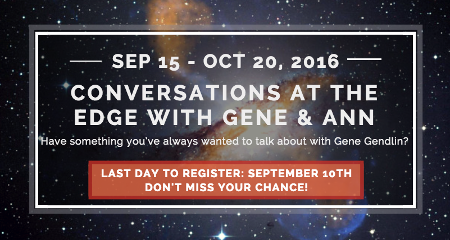 I am deeply grateful for having had the opportunity to attend “Conversations from the Edge with Gene and Ann” (“Conversations at the Edge with Gene and Ann”) during these last weeks of September and October 2016. Ann Weiser Cornell has been organizing these for a long time “Conversations from the Edge with Gene and Ann” several times a year through its platform, Focusing Resources, in the format of a phone course (or by computer, but only with voice) by Gene Gendlin and herself in which those of us who participated could ask for whatever we wanted: Gene Gendlin's answers to our questions, ideas for our proposals, and even that Gendlin himself accompanied us in a process of Focusing.
I am deeply grateful for having had the opportunity to attend “Conversations from the Edge with Gene and Ann” (“Conversations at the Edge with Gene and Ann”) during these last weeks of September and October 2016. Ann Weiser Cornell has been organizing these for a long time “Conversations from the Edge with Gene and Ann” several times a year through its platform, Focusing Resources, in the format of a phone course (or by computer, but only with voice) by Gene Gendlin and herself in which those of us who participated could ask for whatever we wanted: Gene Gendlin's answers to our questions, ideas for our proposals, and even that Gendlin himself accompanied us in a process of Focusing.
 Gratitude, admiration, humility… I had already heard Gene Gendlin on audio and video recordings, and it had been very inspiring. But talking directly to him on the phone is something profoundly different.. Even though I didn't dare to ask anything during the first three sessions, hearing him interact live with other people has a very special quality. Your presence, its openness and its clarity move me, and Gene shares his wisdom in little pearls and especially with his attention.
Gratitude, admiration, humility… I had already heard Gene Gendlin on audio and video recordings, and it had been very inspiring. But talking directly to him on the phone is something profoundly different.. Even though I didn't dare to ask anything during the first three sessions, hearing him interact live with other people has a very special quality. Your presence, its openness and its clarity move me, and Gene shares his wisdom in little pearls and especially with his attention.
And I would like to share some of the ideas that I have enjoyed the most.:
- The concept of “Cross”, summarized by Gene: “[The process of] crossing makes it possible to say something and understand it in a new way by expressing it from a new system, saying ‘How is it (or it could be) this an example of that other?'”. We can always say something by expressing it from another point of view. Metaphors consist of saying one thing in terms of another (“A is, in some way, B”).
- A fascinating conversation between Gene and a person on how to define Focusing, and Gendlin's objection to definitively defining the conditions “necessary and sufficient” to say that something is Focusing. One of the many ideas that appeared in that “Focusing is being with an 'it', even when no relief has yet occurred”.
- Focusing as a way of listening to our internal movements: “There is much within us that wants to be heard and that has not yet been heard. What is it in me that wants to be heard?”.
- A message full of hope: “Focusing does not require confidence in the process beforehand”, with the sense that we can begin a process of focusing even when we distrust something inside ourselves, and throughout the process we will come to trust it.
- Gene sharing what is considered “very biased in favor of keeping the good things and leaving aside the bad”, meaning that you prefer to focus on the enjoyable aspects of each process and not insist on trying “understand” (from the head) the painful aspects once the process has resolved them: “You don't need to go in there”, He said.
- “Focusing is a technique, but it's not just a technique”.
- Focusing is always an internal process, even when focusing on external objects (trees, landscapes, paintings…): there is always a bodily sensation.
- Formulation “We will spend a minute with that“, allowing the word “that” contains all meanings, no specific words, so when words appear, are new and fresh.
- Talking about how a culture can shape a person's experiences, Gene said: “Every human being is always much more than his culture”.
- “The felt sense is always more reliable than emotion or logic or reason alone”.
And I have a special memory of talking to Gene about how I approach finding a foothold for violence with Focusing, so that we can detect and prevent it, just as I usually teach in my training to Child Protection professionals (of Social Work, Psychology, Education…) and families. A memory of your interest and of receiving your support and encouragement to continue exploring.
There were also many other interactions full of interesting ideas and experiences., with the presence of Gene and Ann. I keep them warm, and in private.
So i feel gratitude, admiration and humility for having spent these hours listening to Gene Gendlin live, with its warmth, its opening, your curiosity, their deep interest in what each participant wanted to ask or share. A real lesson. An inspiration. And a celebration.
From here I send my gratitude to Gene for being available and to Ann for making it possible at all levels.
With gratitude, admiration and humility,
Ideas from “Conversations at the Edge” with Gene Gendlin and Ann Weiser Cornell 2016
25 October 2016.
Tags: Focusing community, Focusing, Focusing international, In English, Textos Focusing, Experiences
Gratitude, awe and humbleness – those feelings stand up among all the rest after attending the latest course with Gene Gendlin and Ann Weiser Cornell about Focusing, the Philosophy of the Implicit and Gendlin’s work.
 I am deeply grateful for having had the opportunity to join “Conversations at the Edge with Gene and Ann” during these past weeks of September and October 2016. Ann Weiser Cornell has been organizing these “Conversations at the Edge with Gene and Ann” several times a year through her platform Focusing Resources as a phone course by Gene Gendlin and herself in which participants can ask whatever they want: questions for Gene Gendlin, requests for ideas and even to be accompanied through a Focusing process by Gendlin himself.
I am deeply grateful for having had the opportunity to join “Conversations at the Edge with Gene and Ann” during these past weeks of September and October 2016. Ann Weiser Cornell has been organizing these “Conversations at the Edge with Gene and Ann” several times a year through her platform Focusing Resources as a phone course by Gene Gendlin and herself in which participants can ask whatever they want: questions for Gene Gendlin, requests for ideas and even to be accompanied through a Focusing process by Gendlin himself.
 Gratitude, awe, humbleness… I had already listened to audio and video files of Gene Gendlin, and I have found them very inspirational. But being with him in a conversation over the phone is something profoundly different. Even if I did not dare to ask anything during the first three sessions, listening to him interacting live with other people has a special quality. His presence, his openness, his clarity are very moving, and he shares his wisdom with some pearls of his knowledge and his attention.
Gratitude, awe, humbleness… I had already listened to audio and video files of Gene Gendlin, and I have found them very inspirational. But being with him in a conversation over the phone is something profoundly different. Even if I did not dare to ask anything during the first three sessions, listening to him interacting live with other people has a special quality. His presence, his openness, his clarity are very moving, and he shares his wisdom with some pearls of his knowledge and his attention.
And I want to share some of the ideas that I enjoyed the most:
- The concept of crossing, summarized by Gene: “Crossing makes it possible to say anything and be understood in some new way by saying it in a new system, saying ‘How is this (or can be) an instance of that?'” We can always say anything by expressing it from another point of view. A metaphor is possible by saying one thing in function of another: “A is, in a certain sense, B.”
- A fascinating discussion between Gene and a participant about how to define Focusing, and his objection about defining the necessary and sufficient for something to be Focusing. One of the many ideas is that “Focusing is staying with ‘that’, even when there is no relief yet.”
- Focusing as a way to listen to our inner movements: “There is a lot in us that wants to be heard and has not been heard yet. What is in me that wants to be heard?”
- A bright message of hope: “Focusing does not need trust [in the process] in advance,” meaning that we can start a Focusing process even distrusting something in us, and through the process we will arrive to trust it.
- Gene sharing that he considers himself “very biased in favour of keeping the good things and leaving the bad things apart,” meaning that he prefers to stay with the pleasant aspects of each process and not insisting and trying to “understand” (in the head) the painful aspects, once the process has solved them: “You do not need to go there,” he said.
- “Focusing is a technique, but not only a technique.”
- Focusing is always an inner process, even when we are Focusing on external objects (trees, landscapes, paintings…): there is always a body feeling.
- The formulation “Let’s stay a minute with that,” letting the word “that” contain all the meanings, without specific words, so when words come, they will be new and fresh.
- Talking about how a culture can configure a person’s experiences, Gene said: “Every human being is always more than their culture.”
- “The felt-sense is always more reliable than emotion or logic/reason alone.”
And I have a special memory of talking with Gene about my approach to find a handle for violence with Focusing, so we can all detect and prevent it, as I usually teach in my trainings for Child Protection professionals (social workers, psychologists, educators, teachers…) and families, and feeling his interest and receiving his support and encouragement.
There were many other interactions plenty of interesting ideas and experiences, with the presence of Gene and Ann. I keep them with care, and private.
So I feel gratitude, awe and humbleness for having spent these hours listening to Gene Gendlin live, with his warmth, his openness, his curiosity, his deep interest in what each participant had to ask or share. A true lesson. An inspiration. And a celebration.
I send from here my gratitude to Gene for being available and to Ann for making it possible at all levels.
With gratitude, awe and humbleness,
